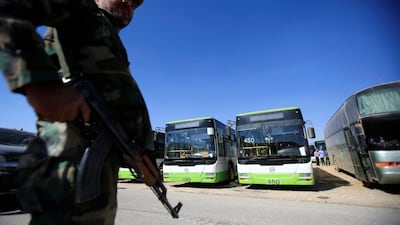When US National Security adviser HR McMaster condemned Iran's mobilisation of proxy militias in the Middle East, he was issuing a call to action against Tehran that will resonate with Washington’s traditional allies.
"Iran is applying the Hezbollah model to the region," he said at a security conference in Munich on Saturday. "Tehran wants the Arab world to be perpetually weak while they grow terrorist groups outside weak government controls that they can use against these governments. This is the case in Syria, Iraq, Yemen."
For years, the Gulf states had warned against former US President Barack Obama’s dogged pursuit of a nuclear deal with their rival across the Arabian Gulf, arguing a settlement that ignores Iran’s funding of militias and proxy military forces such as Hezbollah in Lebanon will simply empower the country’s hardliners. Flush with cash and delivered from punishing sanctions, they would pursue their regional agenda and expand their influence.
Years later, Iran's arc of influence stretches through multiple Arab capitals. In Beirut, it holds sway through Hezbollah, which intervened in the Syrian war in support of Bashar Al Assad despite Lebanon's formal policy of dissociation from the conflict. Hezbollah remains a part of the Lebanese government, which angers Saudi Arabia.
_____________
Read more:
Netanyahu says Israel will act against Iran if needed
Editorial: With Tehran's tactics laid bare, action is needed
Iran applying 'Hezbollah model' to other Arab countries: McMaster
_____________
In Yemen, Iran is accused of providing training and arms to the Houthi rebels, who ousted the Saudi-backed President Abdrabu Mansur Hadi. In Iraq, it has backed the Hashed Al Shaabi, an umbrella group of mostly Shiite militias that have fought ISIL there and been accused of atrocities against local Sunnis after defeating the terror group.
Qassem Soleimani, leader of the Quds Force, Iran's elite Revolutionary Guard's foreign operations wing, has been photographed in battlefields in Iraq and Syria, where Tehran continued to arm and support Shiite militiamen in an effort to carve out a route granting it access to the Mediterranean and to set up a presence close to the Israeli border. Their proxy forces have been instrumental in the continued survival of the Assad regime and its reclamation of territory under rebel control, including the eastern half of the city of Aleppo.
In Syria, a political solution remains beyond reach, observers say partly because Tehran is able to better exert its influence in weakened states.
"I don’t think the Iranians are up for an inclusive political settlement," said one European diplomat. "Iran tends to project power through weak and broken states in the Middle East and it allows its proxies to operate.
"Assad is probably the single most important individual for Iran’s projection of influence in Syria and beyond, so I don’t think they would want to see any political reform necessarily that endangers Assad’s position or weakens his government’s hold," the diplomat added.
But as Iran's power has grown, the White House administration of President Donald Trump appears intent on pushing back. European diplomats are scrambling to add restrictions that would limit Tehran's power projection in the region ahead of a May deadline, when Mr Trump may decide not to waive American sanctions on Iran that have been dormant since the nuclear deal.
It is also part of the rationale for why the US has decided to commit to a long-term presence in Syria, budgeting for a 6,000-strong troop presence in the region as part of the Pentagon's 2018 plan. In northern and eastern Syria, it has backed Kurdish militias and undertaken a nation-building exercise meant to deny ISIL a safe haven but also to counter-balance Tehran’s presence in the country.
"The issue of ISIL is off the table at the moment as a justification for the American military presence in northern Syria," said a senior Turkish official. "It has more to do with a new proxy war, or a set of proxy wars, where they see that Iran is going to stay in Syria for the long run, as a counter balancing force there."
The official added: "This idea is supported by the Americans, Saudis and Israelis, that there should be some counter-force against Iranian presence in Syria. So now obviously this complicates issues a million times more."


